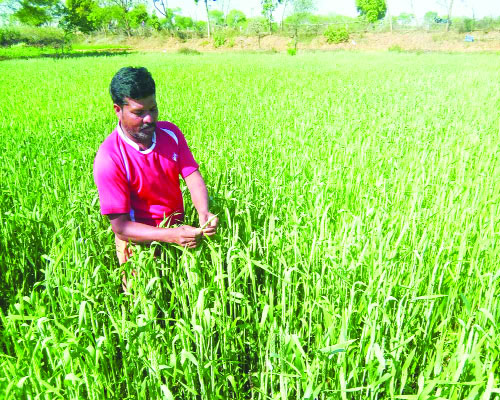The farm Bills may claim to open up the agricultural sector but the implied corporatisation may engulf farming communities
Corporatisation of agriculture in the US, where factory farming birthed an uninterrupted chain of “farm to fork,” has wiped out rural communities, their organic methods, their unique produce, their relevance and independent existence. It all began in the 1970s to realise a dream of becoming big enough to command the world’s food market with industrialised processes, merging of lands and shifting priorities to commodity crops. But in no time there was a glut due to over-production, farmers could never get the commensurate prices and were driven to debts. They had no option but to foreclose and sell out. Now farmers do not even make up a quarter of the total US agricultural production. Buying into the promise of “making it big,” they stretched their resources and were subsumed by food giants. This is exactly the scenario that our farmers fear following the passage of farm Bills, which began as ordinances during the lockdown, in the Lok Sabha. Yes, structurally, they may seem to streamline the agricultural processes but the farmer is not willing to give up his right to exist on his terms. Worse, he fears that these could ultimately reduce the current system of open-ended FCI procurement by the State. Little wonder then that farmers have taken to the streets across North India despite the Prime Minister’s assurance that the new Bills would “empower” them by giving them direct linkages to the market and that their minimum support price (MSP) would still be guaranteed. Such has been the cascading effect of their anxieties that regional parties that sustain on the rural votebank, namely the Shiromani Akali Dal (SAD) and the Jannayak Janata Party (JJP), are under pressure to withdraw support to the ruling BJP as allies. The farmers have made it very clear that there would be no political future for parties and MPs that voted with the Government. So the lone SAD Minister, Harsimrat Singh Badal, resigned as Union Minister of Food Processing Industries while in Parliament Sukhbir Singh Badal warned that the proposed laws would “destroy” the 50 years of hard work done by successive Punjab governments to build the farm sector. While the Government insists that the new laws will help create “one nation, one market” and remove trader barriers so that farmers can sell their produce outside notified grain markets, the latter fear that in an open, competitive market, they would not get the minimum support price that the Government has promised to continue. Besides, they feel that entering into contracts with corporations would willy-nilly give the latter negotiating rights and greater control that would impinge on their autonomy and decision-making. And that although the older system would continue, as a weakened parallel mechanism, it would ultimately crumble before emerging monopolies. It is the implication behind the grandiloquence of a prosperous countryside and the devil in the detail that have our farming community up in arms. For example, the Farmers’ Produce Trade and Commerce (Promotion and Facilitation) Bill 2020, allows buys and sales outside the notified Agricultural Produce Market Committee (APMC) mandis, thereby limiting their cartelisation tendencies. It also prohibits State Governments from collecting the fee, cess or levy for trade outside the APMC markets. A licence won’t be required to trade in farm produce and anyone with a PAN card can now buy directly from growers. Hence they want clarity on what “outside” means and contrary to perception that they want middlemen out, they actually have a trusted bond with their existing commission agents, as their licence is proof enough of their credibility and delivery abilities, and would not want to experiment with an untested model. With most of them not literate enough about exercising their rights, dispute resolution could also end up being loaded against them. Besides, they would want direct payment as banks could deduct amounts as loan recovery. State Governments like Punjab are obviously upset that access to another market would dry up their own revenue from APMC mandis and are seeing this as an affront to federal controls. The Farmers (Empowerment and Protection) Agreement on Price Assurance and Farm Services Bill, 2020, seeks to bring uniformity in contractual farming rules and State APMC acts. So the farmer can now enter into a contract with a corporate entity at a mutually agreed price. The problem here is that the mechanism for price fixation is not codified and farmers fear that corporations could use their institutional heft to manipulate or browbeat them into accepting their terms. Finally, the Essential Commodities (Amendment) Bill, 2020, aims to remove cereals, pulses, oilseeds, edible oils, onion and potatoes from a regulated list, which is being seen as a major threat to the food security of the poor. The Government argues that as a food-surplus nation, we don’t need it anymore but the pandemic-induced crisis has shown us how supply chain disruptions and local level hoarding can lead to a price spiral.
Farmers are not entirely without reason, battling as they are bad loans and non-payment of sugarcane dues in Uttar Pradesh and Rajasthan. They do not want to be swamped. Many experts would argue that it is easy enough to push reforms in a sector that anyway makes a very small portion of our GDP. But farmers make up 60 per cent of the country’s population, a voter base that no political party can ignore. Both the SAD and JJP owe their political legitimacy to farmers and have no option but to advocate their rights. Besides, both represent States that are heavily dependent on procurement at MSP. The Bills may well turn out to be the BJP’s Achilles’ heel provided the Opposition is quick enough to mount a united campaign.


























